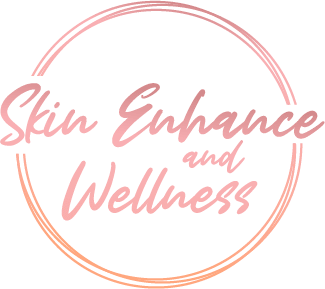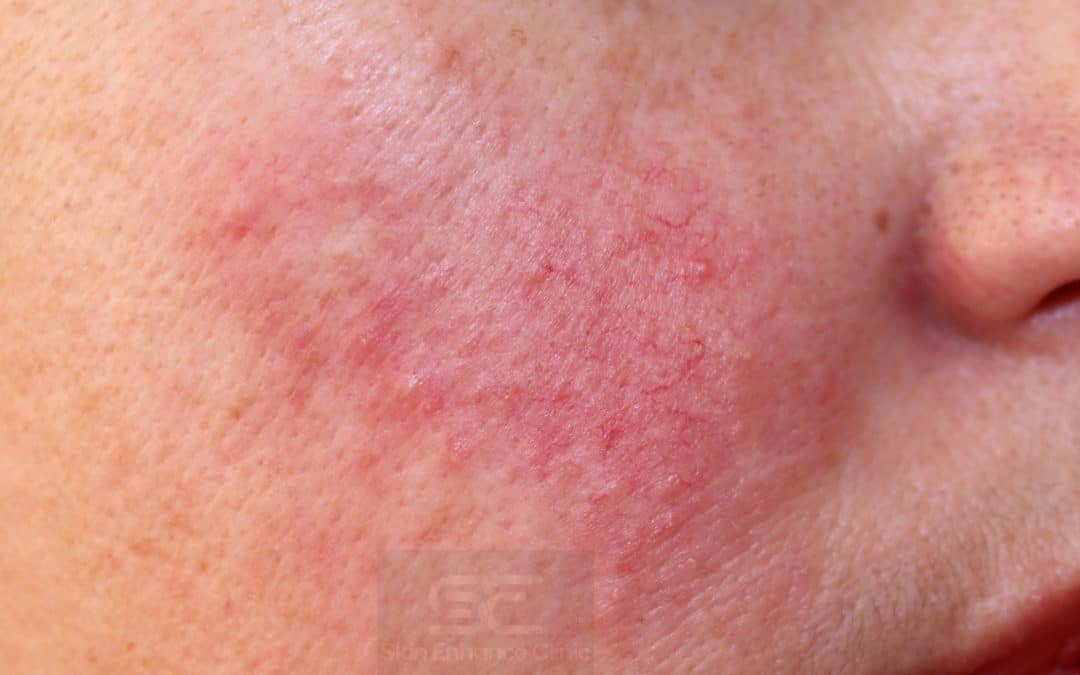Rosacea can cause sensitivity, redness, and flushing attacks on your face. It is more common in women over the age of 30. You may experience blushing attacks on your cheeks with ‘broken’ veins with or without blemishes. Rosacea does affect men, although less commonly but more severely. It may run in families. As it affects the face, it causes low self-confidence and self-esteem. It is a common life-long skin condition that is treatable but not curable.
What are the signs and symptoms of Rosacea?
There are a lot of people with undiagnosed rosacea. This is because it has a slow, gradual onset and therefore, people do not seek treatment, hoping it will go away on its own.
Typical symptoms of Rosacea include increased sensitivity, intermittent reddening of the cheeks and nose. Occasionally, the redness spreads to the forehead and chin. As the condition progresses, blood vessels dilate beneath the skin giving the appearance of visible red lines on the surface. Raised red patches may appear on the skin and small bumps and pus-filled spots may appear resembling acne. The skin may feel sensitive, hot, or sting.
Some people experience swelling of the face while others complain of dry, scaly skin. In men, the skin of the nose may thicken giving rise to colour change to deep purple-red and giving the impression of a larger nose. Some people develop eye symptoms associated with rosacea caused by inflammation and need specialist treatment.
What causes Rosacea?
The exact cause is unknown, but a range of possible theories have been suggested. These include defects in the immune system, abnormal skin barrier function, unstable blood vessels, and genetic predisposition, and microbial overgrowth. The Demodex mite, which is a normal inhabitant of our skin is thought to set off an immune response in rosacea. Whatever the cause, the aim is to calm the skin down to make it less reactive.
How can Rosacea be managed?
Unfortunately, there is no cure for Rosacea. The essence of management is avoiding the triggers and aiming to control the symptoms. Rosacea can be triggered by many factors hence it is worth having a symptom diary to identify the triggers.
What are the common triggers of Rosacea?
Environmental factors can trigger Rosacea:
Sun exposure
Cold weather
Increased humidity
Strong winds
Changes in room temperature
Saunas
Hot baths
Personal factors triggering Rosacea:
Medical conditions like chronic cough or menopause
Medication
Strong emotions such as stress and anxiety
Physical exertion either from occupation or due to exercise
Products:
Cosmetics
Hair products
Skincare products containing certain ingredients and perfumes
Food:
Spicy food
Citrus fruits
Some vegetables
Chocolate
Egg
Dairy
Drinks:
Alcohol
Hot beverages including hot chocolate
Caffeinated drinks such as tea and coffee
Treatment for Rosacea
As the symptoms vary from person to person, it is important to have a bespoke treatment plan for each individual. Medical treatment available from the General Practitioner includes topical or oral medication often taken in repeated courses.
Skincare products should be carefully selected for Rosacea.
Cleanser:
This should be a hydrating and soothing cleanser that is not harsh on the skin. It should not strip too much moisture from the skin surface.
Serums and Moisturisers:
These should be able to strengthen the skin’s protective barrier, making it less vulnerable to irritants while reducing redness or puffiness. Antioxidants will help neutralise free radicals and pollutants from irritating the skin. Medical grade skin care products contain various patented ingredients capable of reducing bacteria level, supporting unstable blood vessels, reducing inflammation, calming redness while restoring hydration.
Sunscreens:
This should be broad-spectrum against both UVA and UVB radiation. Avoid chemical sunscreens, instead, look for a physical sunscreen with Zinc oxide and Titanium Dioxide.
At Skin Enhance Clinic, products are available from NeoStrata®, ZO® Skin Health, Obagi® Medical, SkinMed® and AlumierMD for Rosacea or sensitive skin.
April is Rosacea awareness month and the fluctuating weather conditions have not helped sufferers. If you suffer from sensitivity on your face, chances are you do have rosacea. The only way to manage this chronic skin condition characterised by flare-ups and remission is to be armed with knowledge and better awareness to diagnose and treat early to avoid progression.


Recent Comments